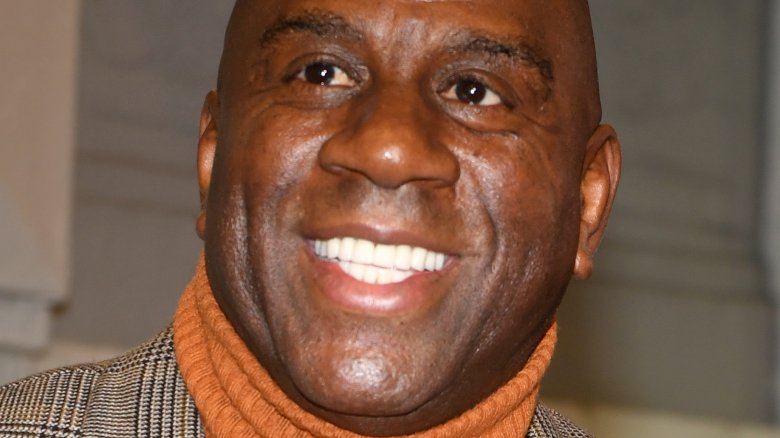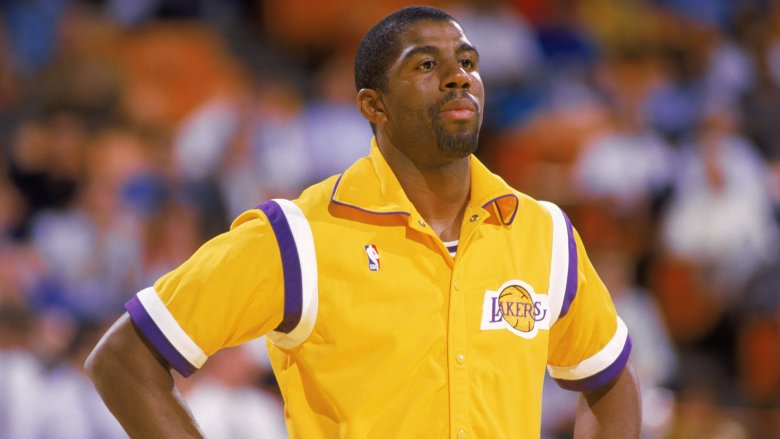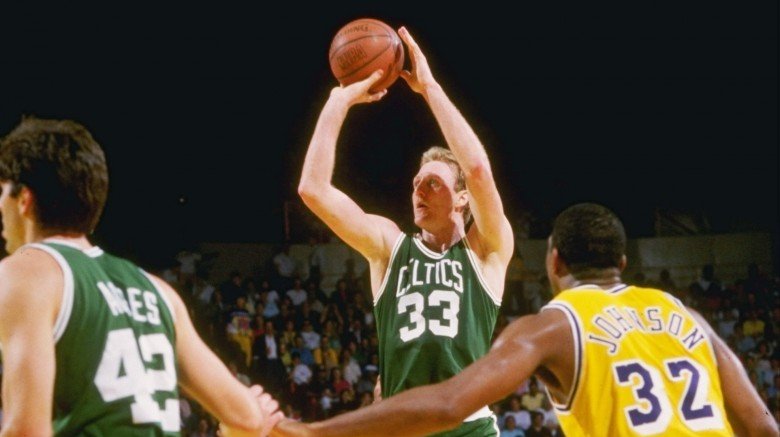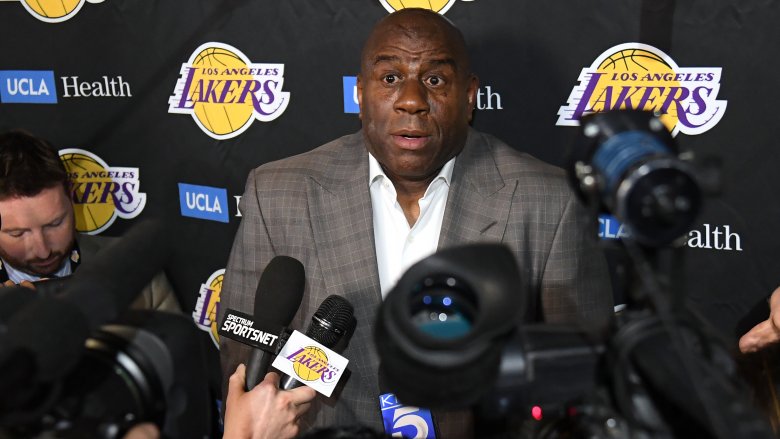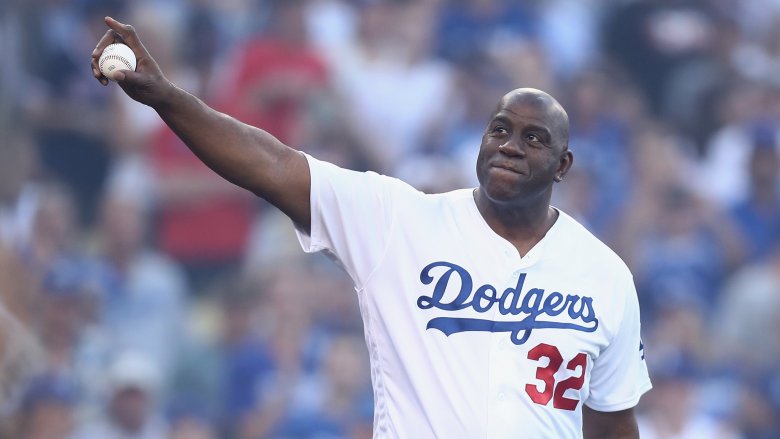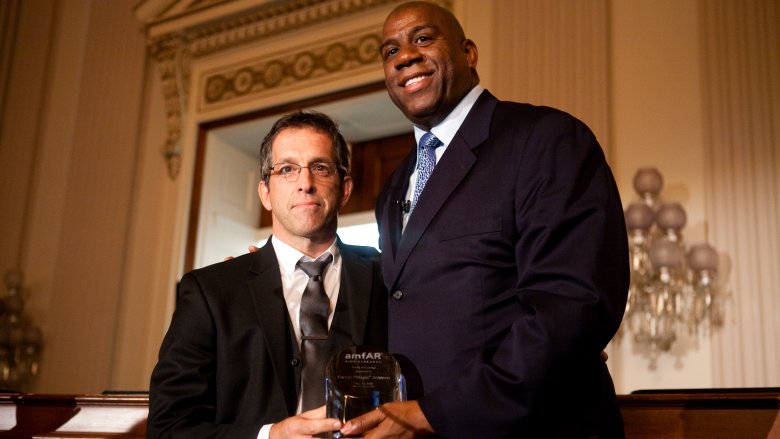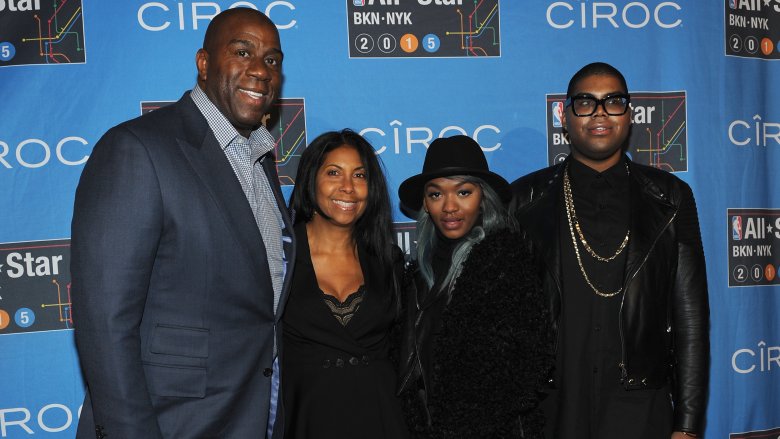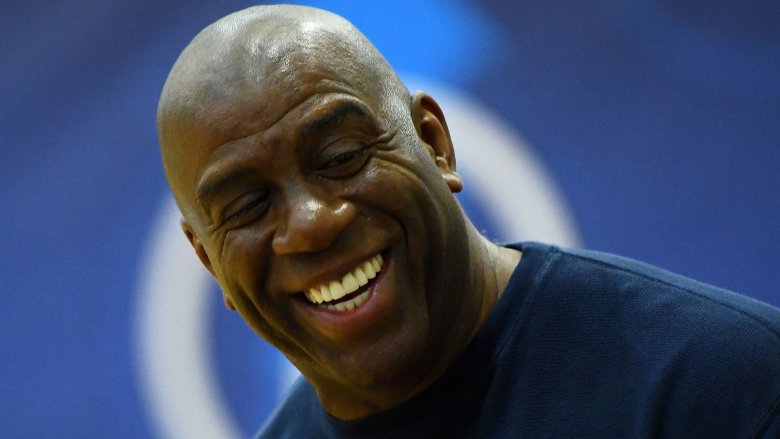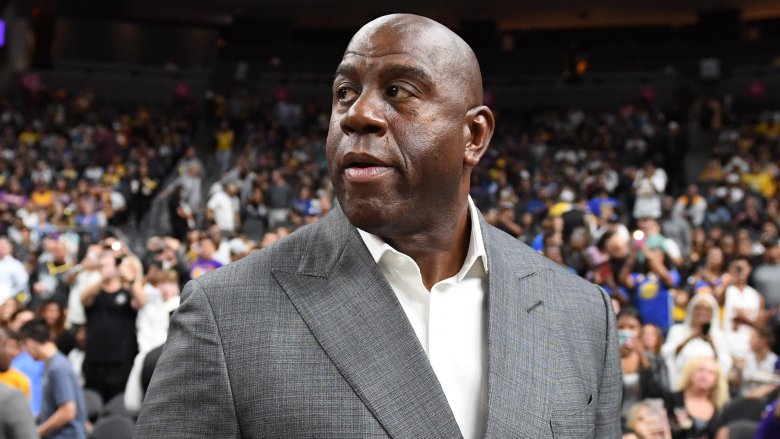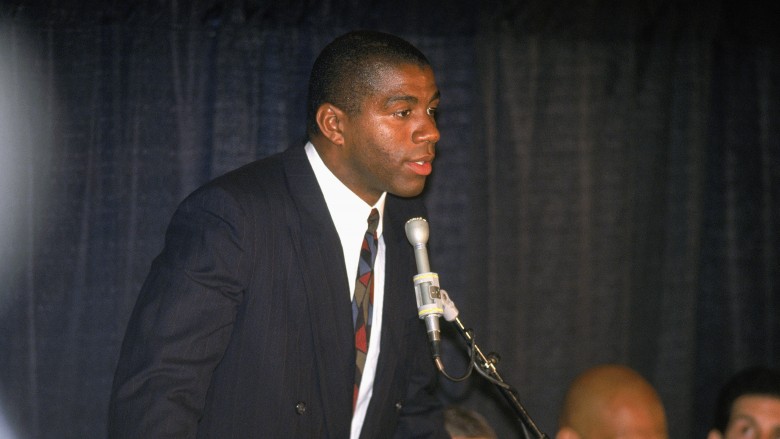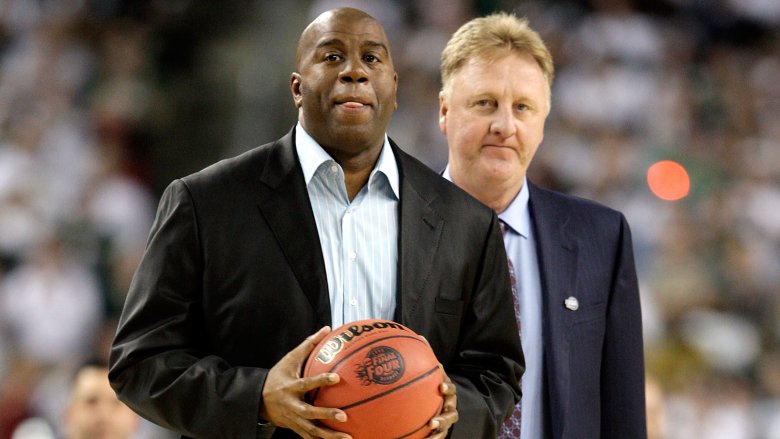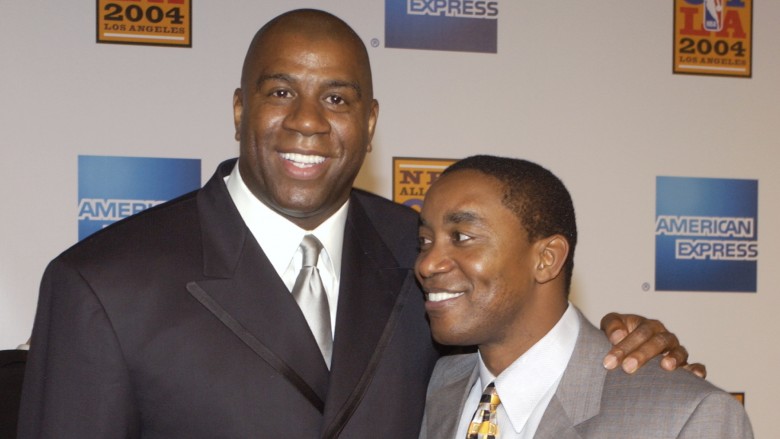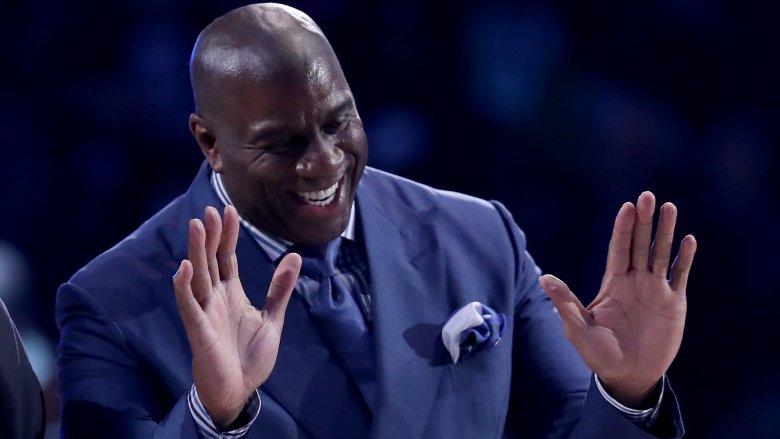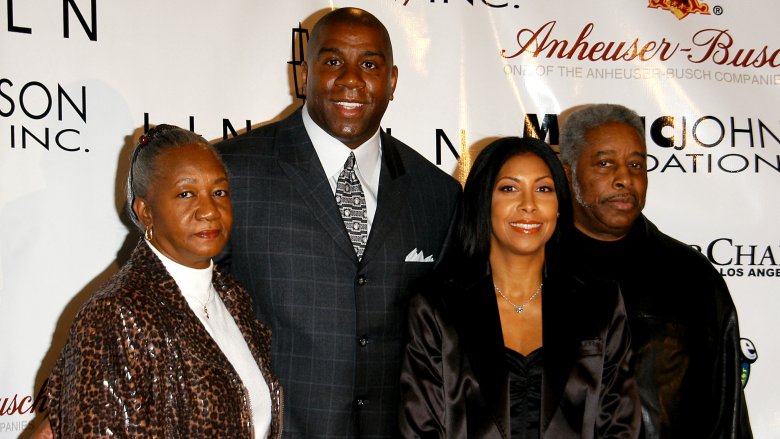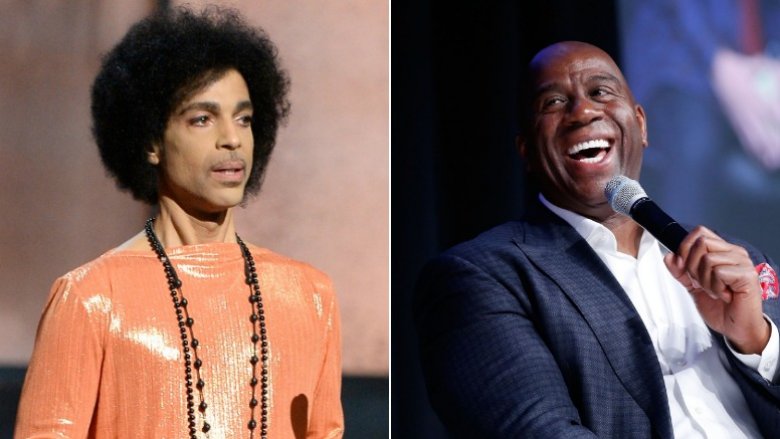The Untold Truth Of Magic Johnson
Earvin Johnson Jr. has lived an amazing life that could only be summed up in one word — "magic". In Johnson's own words, he was a "little kid from Lansing, Michigan," who "grew up poor but ... didn't have poor dreams." The basketball legend with the million dollar smile, uncanny vision, and unbridled passion for the game, had to retire while still in his prime after contracting HIV. But that was only his first act. Magic went on to become a leading spokesperson for the deadly disease, changing the world's perception about AIDS.
After retiring from the NBA, Johnson found a second act as a successful businessman by investing in underrepresented urban communities but basketball would always be his first love — that is, until he allegedly felt "backstabbed" by the very organization that made his legendary career. His life reads like modern Shakespeare, full of mythical triumphs and tribulations, tragic heroes and redeemable villains, but how much do you really know about the man who wore the number 32 jersey? This is the untold truth of Magic Johnson.
His hated nickname
Earvin Johnson had no plans to be Magic. To his family, he's called Junior, as in Earvin Johnson Jr. His neighbors called him June Bug growing up. It wasn't until his sophomore year of high school that he became magical. Earvin turned in a mighty performance one game — a triple-double (double figures in points, rebounds, and assists). A local sportswriter dubbed him Magic, and a legend was born. Johnson couldn't have been happier in hindsight. "My original nickname disappeared a long time ago, which is fine with me," he wrote in a column for The Seattle Times. "Man, I'm glad I didn't have to go through my professional career with that name
With his new nickname in tow, Johnson's lore grew as a high school basketball star. He attended nearby Michigan State University and led the Spartans to a national title, and then became one of the greatest NBA players ever. Everyone knew Magic. Only one problem with his famous name — his mother hated it. As a devout Christian, she considered the nickname "blasphemous," according to NBA History. We're guessing his folks never stopped calling him Junior — probably even Earvin when they were mad.
He saved the NBA
It's hard to believe the NBA was at one time about as popular as professional bowling. The NBA finals were tape-delayed, airing long after the game ended. What the NBA needed was stars, and drama, and by dumb luck it fell into their laps. The Boston Celtics and Los Angeles Lakers were already two of the biggest franchises in NBA history, and fresh off the most-watched NCAA finals in history at the time, the 1979 NCAA championship between Magic's Michigan State Spartans and Larry Bird's Indiana St. Sycamores, the two traveled to different coasts to continue the rivalry.
In the NBA, the two stars led their teams to championships, and faced off against each other for championships. Magic was fast and uptempo — a "showtime" of excitement. Bird was old school — beat you with his deadly jumpers and ability to make a shot from anywhere. And of course, one was black and one was white — which was still a big deal back then. But the two embraced the competition, and played it up in marketing as much as on the court. It worked. As much as Michael Jordan did for basketball by being that flashy superstar, Magic Johnson, by understanding the value of a rival, put the league where it is today thanks to his rivalry with Larry Bird.
He feels betrayed by his NBA family
Magic Johnson is arguably the greatest Laker ever. His relationship with the Los Angeles team dates back to 1979 when he was drafted number one overall. Since then, he has bled the "purple and gold" as a player, coach, owner, and president of basketball operations. He described his most recent title of overseeing the Lakers as his "a dream come true" (via The New York Times), and one which former team owner, the late Dr. Jerry Buss envisioned for him. "He'd tell me his vision was for Jeanie (Dr. Buss daughter) and I to run it," recalled Johnson to ESPN. Jeanie took over as the Lakers owner, and fulfilled her late father's wishes in 2017 when she handed Johnson the keys to the iconic franchise.
A season later, Johnson orchestrated the mega-deal that would bring NBA superstar LeBron James to the Lakers. The team had high hopes heading into the 2018-2019 season but vastly underperformed, missing the playoffs, marking the first time James hasn't played in the post-season since 2005. Much of the blame fell on Johnson, who then shockingly stepped down as team president in an impromptu press conference where he shed tears over his decision. According to NBA insider Stephen A. Smith, Magic felt "betrayed" by Lakers management. Further reporting by Bleacher Report's Ric Bucher (via Sports Illustrated) allegedly revealed that Johnson was being accidentally CC'd on disparaging emails between "Lakers General Manager Rob Pelinka and owner Jeanie Buss."
He's still got the magic touch
Johnson walked away from his beloved Lakers, but he is literally invested in three other prominent Los Angeles sports franchises. Magic was the "public face" of the deep-pocketed Guggenheim Baseball Management group that bought the Dodgers for a then-record $2 billion in 2012. While the "boys in blue" have been revitalized, winning six division titles (from 2013 to 2018) and appearing in two World Series (2017 and 2018), they haven't won (as of this writing) that elusive MLB championship since 1988. "I want [a World Series win] for the players," Magic told ESPN in 2017, adding, "Man, I want it for them. I want it for the fans, who have waited so long."
Johnson also brought his winning ways to the Los Angeles Football Club (LAFC), of which he shares ownership with a number of partners including Will Ferrell, Tony Robbins, and women's soccer great Mia Hamm Garciaparra. LAFC had a historic first-season run in Major League Soccer by earning the "most points by an MLS team in its expansion season," which led to a 2018 playoff-bid.
While Johnson sold his minority stake in the Lakers in 2010, he did return to professional basketball ownership by buying into the Los Angeles Sparks WNBA franchise in 2014. Citing Johnson's "larger-than-life personality" and proven business record, WNBA President Laurel Richie told The Associated Press (via the Daily News), "When Magic chooses to enter into a partnership with a WNBA team, that's a great thing."
He's still making an impact off the court
According to CBS News, Johnson became "the face of HIV/AIDS" when he shocked the world with his diagnosis during a dramatic 1991 press conference. "I was just devastated, blown away," Johnson recalled to CBS News. "We have to remember at that time, people were really dying of AIDS. I was just scared to death." His stellar NBA career was over but a meeting shortly after with AIDS activist Elizabeth Glaser would give the five-time NBA champion a new purpose in life. "She made me promise before she died that I would become the face of the disease and really go out and help people and educate people about it," Johnson told PBS Frontline.
Since 1991, Johnson has travelled the world, becoming an ambassador for treatment and prevention of the deadly virus, and speaking out against the early myths that were often associated with the disease. He also started the Magic Johnson Foundation, which has "worked to promote more testing and give minority communities better access to treatment," according to Fox Sports.
The AIDS Healthcare Foundation honored Johnson for his activism by giving him the inaugural World Aids Day Magic Award. "I haven't played in 15 to 20 years and now when people come up to me it's never about basketball," Johnson told Fox Sports in 2010. "I guess I've turned the page on another chapter in my life."
His kids are alright
One of the sidebars that sometimes gets lost in Magic's shocking HIV announcement in 1991 was that his wife Cookie was pregnant with their first child at the time. Although Earvin Johnson III (aka E.J.) was born with a clean bill of health, his "public life began when he was still in the womb," according to The New York Times. The outlet also reported that E.J. became a reality television star (E!'s Rich Kids of Beverly Hills), and used his platform to "seize his own place in the gender revolution" with his "ostentatiously androgynous style." The younger Johnson also became a game-changer in his own way after being "outed" by TMZ in 2013.
"It was hard for me in the beginning," Magic told CNN's Lisa Ling when he saw his son playing with dolls as a child. "I kept taking them away and putting something else on the table." Eventually Johnson accept his son's sexuality with open arms. "It's all about you not trying to decide what your daughter or son should be or what you want them to become," Johnson shared on The Ellen Degeneres Show. "It's all about loving them no matter who they are or what they decide to do."
While Johnson's older son Andre (whom he had with a previous girlfriend) prefers to stay "low-profile"(per TMZ), his youngest, daughter Elisa, is a budding model/social media star, although she also topped timelines for escaping an attempted home invasion in late 2018.
There's nothing magic about how he lives with HIV
Magic Johnson has lived with HIV since 1991, which naturally hasn't come without a fair share of ups, downs, and unknowns. Speaking with Newsweek in 2011, Johnson, who at the time remained AIDS-free, offered some insight into his ongoing challenges. "I'll hear people say every so often that having HIV must not be so bad — just look at Magic and how well he's doing. I'm blessed that the medicine I take really worked well with my body and makeup. It doesn't work like that for everyone. A lot of people haven't been as fortunate as I have."
So how has the NBA Hall of Famer lived with a virus that many felt at the time of his 1991 announcement was a "death sentence" (per Live Science)? Doctors put him on a new "cocktail of antiretroviral medications" in 1994 (per Newsweek), which were, at the time, still being used in "clinical trials," according to Spencer Lieb, senior epidemiologist and HIV/AIDS research coordinator for the Florida Consortium for HIV/AIDS Research.
While there is no cure for HIV as of this writing, Johnson has grown old enough to become a grandfather. "It was such a special moment, to be able to hold and play with my granddaughter and see my son (Andre) actually become this great husband and father," Johnson told Newsweek of the milestone. "Man, you don't know — I had to stop myself from tearing up, because who knew? Who really knew?"
His diagnosis led to a lawsuit
Magic Johnson was bluntly honest about how he contracted the disease — he had lots and lots of sex. There comes a question — did Magic Johnson know he had "something" yet still have sex with people? One of his lovers thought so. In 1992, not too long after his announcement, a former partner, Waymer Moore, sued Magic claiming that he gave her the virus that causes AIDS.
Magic admitted he knew the woman for a number of years, and they did indeed have sex in June of 1990, but he denied giving her the disease and actually suggested that he wasn't sure if she was the one who gave it to him. Moore revealed that she knew she had the disease prior to his public announcement of his HIV diagnosis, and allegedly wrote him a letter informing him so. The two sides eventually reached an agreement to dismiss the case in 1993, but no financial terms were released.
He'll never know how he contracted HIV
In terms of public opinion circa 1991, Magic Johnson's HIV announcement meant only one thing; Magic was gay. HIV/AIDS was still thought of as a so-called "gay disease" (per Avert), despite the existence of high-profile cases that didn't involve homosexuality, like like the Ryan White story. Magic admitted that upon arrival in Los Angeles in 1979, he had sex with just about any lady that would accommodate. He denied any homosexual encounters. So how did he get HIV?
If Waymer Moore's story is true, Magic had the virus by at least by June of 1990, more than a year before his official announcement. The most common rumor was that Magic contracted the virus during one of actor Eddie Murphy's wild sex parties, "where often times, transsexual hookers were involved," according to Gawker. Why has the rumor persisted? Partly, because science says that female-to-male transmission of HIV is rare — up to "20 times less likely" than male-to-female transfers (per Gawker). But even with a bit of out-of-context scientific data, the rumors are just that — rumors.
He became BFF's with his most hated rival
Magic Johnson will forever be linked to fellow NBA Hall of Famer Larry Bird. Their fabled rivalry began in the classic 1979 NCAA title game where Johnson's Michigan State Spartans defeated Bird's Indiana State Sycamores 75-64. The stakes were raised when they became the franchise faces of the Lakers and Celtics, battling it out over the next decade in one of sports' fiercest tug of wars. "The one thing I hate in life... is the Boston Celtics," said Johnson in ESPN's documentary Celtics/Lakers: Best of Enemies.
The superstars' fiery relationship cooled after filming a 1985 Converse commercial filmed in French Lick, Ind., Bird's hometown. "His mom gave me the biggest hug and hello, and right then she had me," Johnson told NPR. "Then Larry and I sat down for lunch, and I tell you, we figured out we're so much alike. We're both from the Midwest, we grew up poor, our families (are) everything to us, basketball is everything to us. So that changed my whole outlook on Larry Bird."
Their relationship grew to the point where Bird was one of the first people Johnson called when he was diagnosed with HIV. "As strong as I appeared to be, I still needed a friend to just say, 'Hey man, I'm here, I'm supporting you," recalled Johnson, who has since developed a lifetime friendship with Bird.
The fallout with friend Isiah Thomas
Magic Johnson and Detroit Pistons star point guard Isiah Thomas were very good friends. When the two faced off in the 1989 NBA finals, they famously kissed prior to tip-off, which possibly fueled the rumors years later that Johnson was secretly gay. An uninformed 1990s mentality thought, "Why would a guy kiss another guy?" Ironically, it would be Thomas that helped the rumors run wild.
Johnson wrote in his and Larry Bird's 2009 memoir When The Game Was Ours, that Isiah questioned his sexuality. The rumor was that it was Thomas who then told anyone that asked about his good friend Magic that he was indeed gay or at least bisexual — and regardless of if Isiah did spread those or not, there were repercussions. Magic admitted to "[refusing] to advocate for Thomas for a spot on the 1992 Olympic "Dream Team" made up of NBA players, partly for his alleged role in spreading rumors.
Years later, the two reconciled, but there's no doubt that the influential Magic played a role in keeping Thomas off the greatest collection of athletes on one sports team ever. That's a pretty steep payback for a rumor about a rumor.
NBA legend to business mogul
Magic Johnson has won everywhere he's been, so it's no surprise he made a successful transition from the basketball court to the corporate boardroom. He was mentored by the late, great Dr. Jerry Buss, the Lakers legendary owner who took the 19-year-old basketball star under his wing. "He said, 'Earvin, let me teach you the business,'" Johnson recalled to the Los Angeles Times. "He brought me in, showed me the books, taught me how it all works, introduced me to people I would never have met, made me understand what it means to be in L.A."
After Johnson's retirement, he used what Buss taught him to launch a "business career with a couple of Pepsi bottling plants, then built from there into shopping centers and movie theaters in urban areas," according to Business Insider. Johnson's extraordinary business skills eventually led him to a lucrative deal "50/50" deal with Starbucks, where he developed locations in underrepresented urban markets.
With those projects and many more, Johnson built himself into an entrepreneurial legend with a net worth of over $600 million, and ownership stakes in several iconic LA sports teams. According to the Los Angeles Times, The first person he called was Dr. Buss to let him know he would have to sell his piece of the Lakers, "He said, 'I don't mind losing you as a partner, because you just made a Magic move. I started crying."
He is very charitable
Magic gives back in more ways than just providing shops in the inner cities and profiting off of them. He's also extremely charitable. The Magic Johnson Foundation has contributed over $20 million to various charities and provided $4 million in scholarships, according to CNN. And a significant portion of his donations go right back to those same communities where he provides businesses.
And then there's his HIV/AIDS awareness. Johnson didn't shy away from the disease. Instead, he spread awareness — most importantly the truth — of what it meant to have HIV and what you could and couldn't do. There were others before him with the disease who first put a face on it, but Magic showed that you can live with HIV, and his financial contributions have excelled the race to not only find a cure, but to enhance the lives of people living with the conditions. In fact, Johnson told the Los Angeles Times in 2011, that through his partnership with the AIDS Healthcare Foundation, he helped open seven clinics where "people all over the country can come in and get their HIV meds for free."
Magic's greatest contribution to music
Magic Johnson has a bit of an old-school vibe to him. A lot of people end up liking the music they listened to in college for life, but Johnson goes a bit further than that. He sang the praises of Otis Redding, and made sure that when he checked out Maze featuring Frankie Beverly, everybody knew it. Of course, there was also a business component. According to Billboard, Magic Johnson Music worked in conjunction with MCA Music, scored R&B hits with Avant, and had music management deals in place with Boys II Men in the late 90s. So obviously he likes his music, but nothing compares... nothing compares... to Prince.
Johnson shared a story on Jimmy Kimmel Live! about playing basketball with Prince. "He talked so much trash — he thought he had a real jump shot," the former NBA legend told the late night host. Sure, against one of the greatest basketball players ever Prince couldn't hang, but against mere mortals like Charlie Murphy? That's a different story. Johnson also told of Prince asking him to hold a private screening at one of his Magic Theaters in Los Angeles at 2 a.m., which Johnson did — and to which Prince, and a busload of his friends, showed up in pajamas. There are never enough Prince stories; the internet thanks you, Magic.
The (not so) Magic Hour
Not everything Magic touched turned to gold. Magic Johnson decided to get into the talk show business in 1998. He must've seen an avenue for super tall guys who are awkward on camera, but the show wasn't especially good. It somehow lasted two months before getting the Ole Yeller treatment. According to the book Worst Ideas Ever: A Celebration of Embarrassment, there really wasn't any reason to think Magic could pull it off, and he proved it by being "ill at ease, not really interested in his guests, and generally uncomfortable" — In other words: it was the Bad Idea Jeans of talk shows. But Magic didn't see it that way.
Johnson blamed the failure on black celebrities. "We all have to support each other, and we don't do that," Magic told Electronic Urban Report (via People). He continued, "Black stars think that if they're not on Leno or Letterman, then they're not making it. Their managers and agents keep them off of the black shows. There it is, that's your major problem right there."

